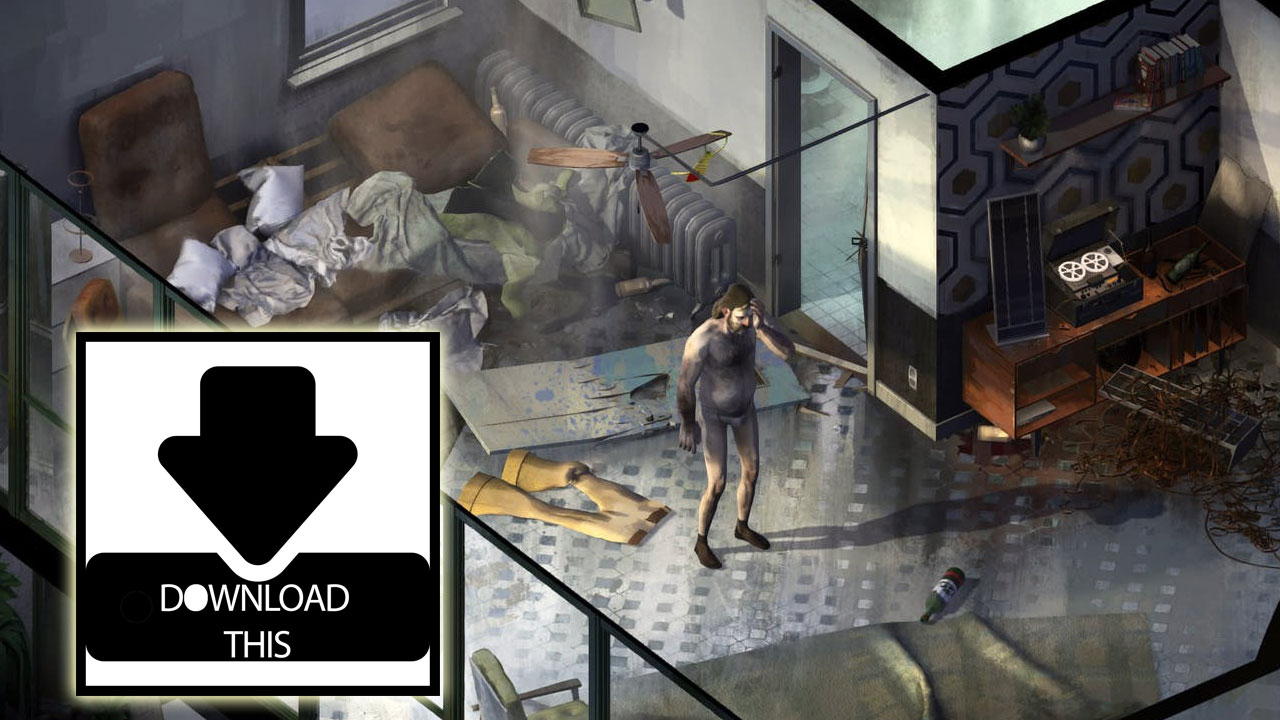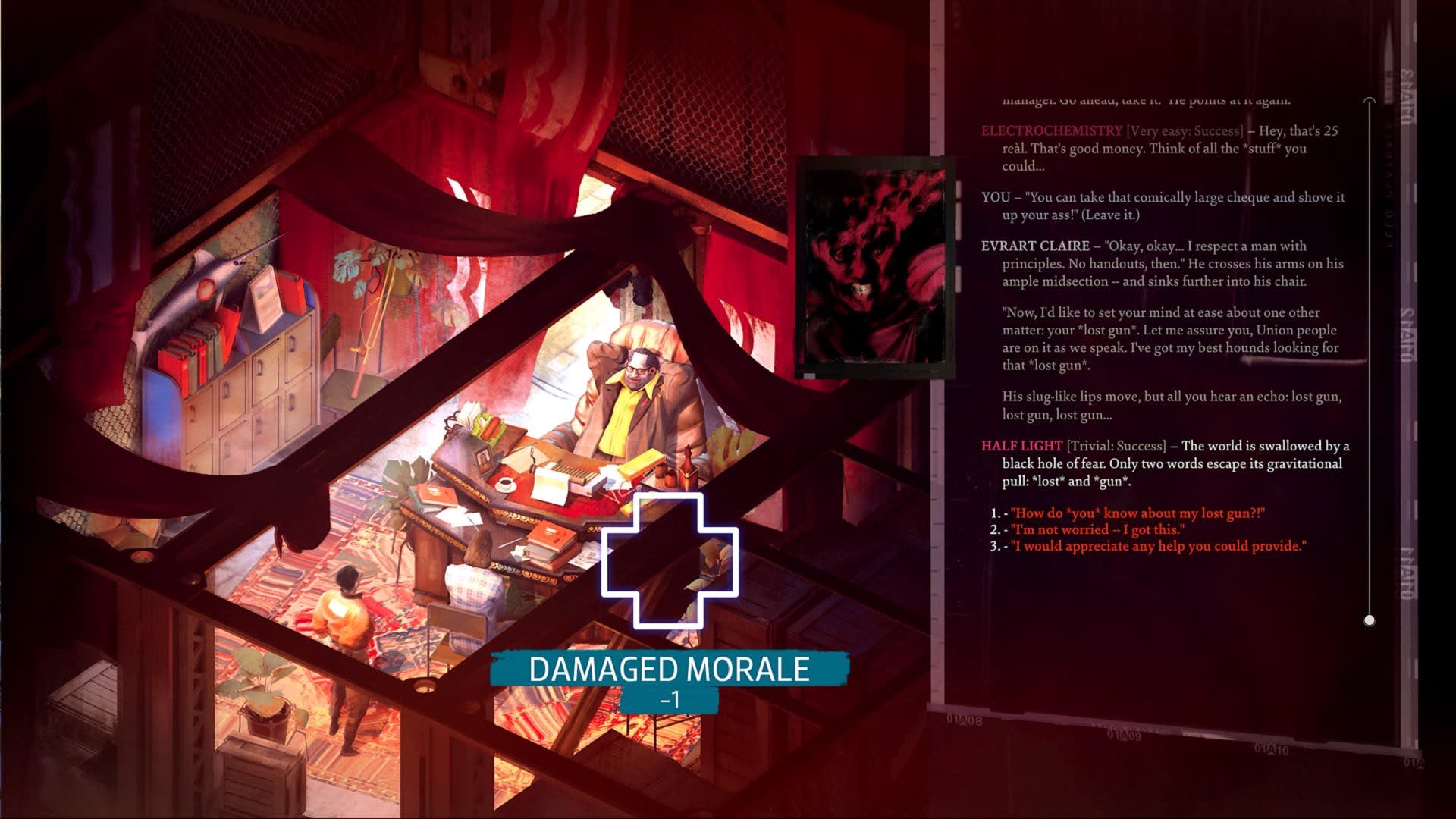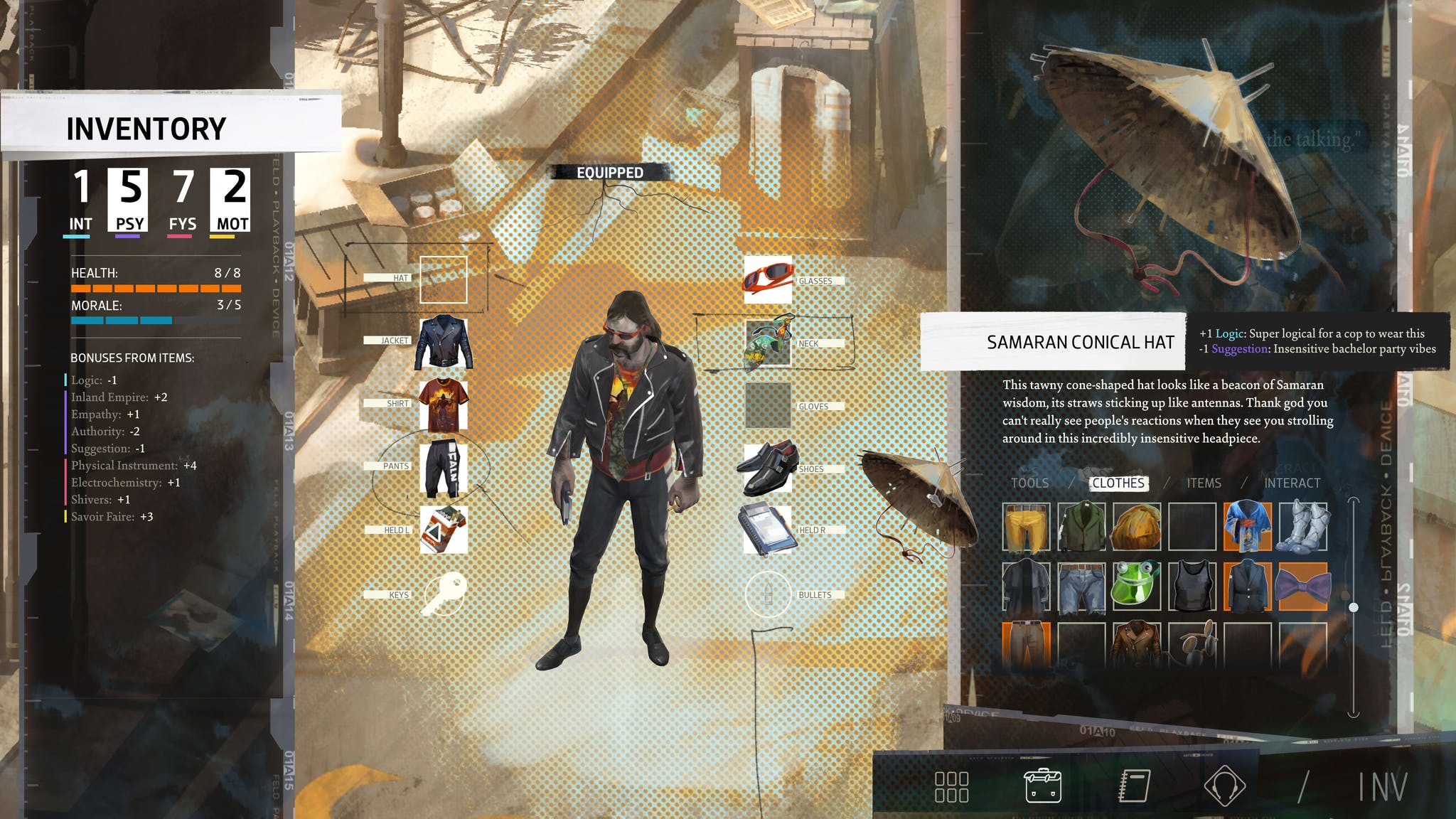Disco Elysium's choices capture the full spectrum of life's disasters
“There is nothing. Only warm, primordial blackness.”

You’re reading Download This, TechRadar’s weekly guide to the must-have downloads to fill your phones, tablets, consoles and computers with. Games, eBooks, albums, apps or movies – we’ve got you covered.
Lots of games want you to believe they deal in shades of grey. Mass Effect’s Paragon and Renegade system lets you shuffle your feet between intergalactic Good Cop and Bad Cop, your appearance in the Fable series visibly alters as you go from delightful to dastardly, and BioShock lets you murder-harvest weird little kids… or not.
But Disco Elysium, the hit PC RPG now available on PlayStation 4 and PS5 and soon coming to the Nintendo Switch, doesn’t just deal in shades of grey. It deals in hangover-purples, blood reds and nauseous greens. It’s unlike any other narrative driven game I’ve ever played, and the first where I truly have no idea what will happen next.

One of the key mistakes that many gaming morality systems make is that, despite giving the illusion of choice, they tend to lock you into one of just two paths. “Min/maxing” a heroic or evil stat usually brings with it some sort of reward, be that an achievement or a power unlock for being a saint or right bastard. You find yourself gravitating to one alignment or another in order to pick up its ultimate prize, even if the choices offered up don’t really suit your character. They deliver custom, gated pieces of the overall experience, rather than melding in with the game as a whole.
Disco Elysium is not so simple. As much an interactive novel as it is a role playing game, it revels in words and all their possibilities for nuance, depth and confusion. It takes the amnesiac hero trope and runs with it – letting you piece together not only who you once were through your dialogue choices, but who you want to be through your interactions with the world and its inhabitants.

Limbic lament
The grimey nature of the path ahead of you is made clear from the game’s opening moments. Yes, you’re amnesiac, but not through the machinations of some ancient being or world-altering event. No, you’ve just got the mother of all hangovers, you're fuzzy in your Y-Fronts and you're one wrong move away from accidentally hanging yourself on a necktie hanging from a fan – and this is only five minutes into the game. It’s not the best way to start the Disco Elysium’s twisty-turny murder mystery, but a taste of things to come.
It only gets more grim as you progress through the game. Should you pawn an old lady’s commemorative broach to pay for your lodgings? Pull the armored shoes from a dead man’s body? Do a line of speed to shake the god-awful ennui that’s wrapped like a weighted blanket around your initially-nameless cop’s shoulders? Disco Elysium’s strength is its ability to wrong foot you at almost every decision – while the player character’s inner-thoughts/demons taunt you at every turn, the game never presents you with anything truly sinless, and only rarely overtly rewards or punishes you for making even the wackiest of choices. The real reward, as should be the case with all great role-playing games, is just in seeing where your choices lead you, and knowing that it’d be very difficult for a fellow player to follow in your exact footsteps.

And the so-called “butterfly effect” here in Disco Elysium is staggering. I’ve had two vastly different playthroughs where whole opportunities and gameplay chunks have been closed off to me because of the differing decisions I’ve made. Just like in the real world, you can’t always have your cake and eat it in Disco Elysium – but the slices you do get are so wonderfully weird that it’s cause for praise rather than upset. Every single dialogue choice in Disco Elysium seems to be met with an equally unique response from the non-player characters – and if that’s not true, the writing is so finely crafted as to hide that fact from the player.
Sign up for breaking news, reviews, opinion, top tech deals, and more.
Moonage daydreams
So with no guiding hand of red-or-blue coloured dialogue choices to pick from, you’re really free to get into the mind of your cop, and the feel of Disco Elysium’s fictional post-Communist setting, Revachol – a kind of City 17 as if imagined by Irvine Welsh.

If there is any semblance of reward for pursuing your own path through the game, it’s with the unlocking of ‘Thoughts’ – skill perks that can be earned by carrying out specific acts in the game. But these are never signposted and so cannot be purposefully acquired on first playthrough without checking an FAQ or Wiki beforehand, and often bring with them their own debilitating effects to counter any perceived benefit. I don’t think anyone in their right mind would go out of their way to acquire the “Advanced Race Theory” perk, for instance.
Disco Elysium just puts other games that claim to offer significant choice to shame. It doesn’t want you to be a hero, or even a villain. It just wants you to be you, and trusts that the trouble that that in itself brings will be its own reward.

Gerald is Editor-in-Chief of Shortlist.com. Previously he was the Executive Editor for TechRadar, taking care of the site's home cinema, gaming, smart home, entertainment and audio output. He loves gaming, but don't expect him to play with you unless your console is hooked up to a 4K HDR screen and a 7.1 surround system. Before TechRadar, Gerald was Editor of Gizmodo UK. He was also the EIC of iMore.com, and is the author of 'Get Technology: Upgrade Your Future', published by Aurum Press.